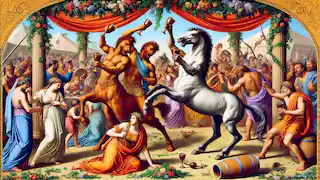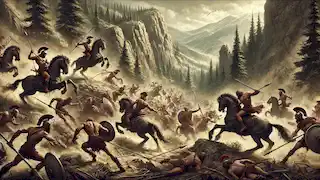In the ancient land of Greece, where mountains scraped the sky and the seas shimmered like sapphire, there lived a race of magnificent creatures, half-human and half-horse, known as the Centaurs. Their origins were mysterious, shrouded in myth and legend, but their presence on Earth was undeniable. Known for their fierce strength and untamed wildness, they roamed the mountainous regions of Thessaly, where their hoofbeats echoed through the valleys and their stories became intertwined with those of the gods and mortals alike. This is the tale of the Centaurs, their rise to power, their conflicts, and their ultimate fate. It all began with a scandalous union, a forbidden affair between the mortal King Ixion of Thessaly and a cloud shaped in the form of the goddess Hera. Zeus, king of the gods, had created the cloud to test Ixion’s loyalty, but Ixion, blinded by lust, mistook it for the goddess and fathered a child. From this ill-fated union, a being named Centaurus was born, a creature caught between the world of gods and men, human in intellect but driven by the raw, untamable forces of nature. Centaurus wandered the world alone, an outcast, until he discovered a herd of wild Thessalian mares. His union with these animals gave rise to the Centaurs, a race born of both human and equine form, embodying the primal conflict between civilization and the untamed wilderness. The Centaurs, as children of both worlds, inherited the strength of horses and the cunning of men, yet they were often torn between their civilized and savage natures. Though Centaurus had many descendants, none were more famous than Chiron and Nessus, two Centaurs whose fates would shape the course of Greek mythology for centuries to come. Chiron, wise and noble, was unlike his wild kin. He sought knowledge and healing, becoming a teacher to many of Greece’s greatest heroes. Nessus, on the other hand, embodied the darker side of the Centaurs—proud and dangerous, his life would end in tragedy, but not before leaving a lasting mark on the world of men. In the high mountains and dense forests of Thessaly, the Centaurs lived a life that reflected their dual nature. They were skilled in the arts of war, wielding bows and spears with deadly precision, their half-horse bodies making them swift and powerful on the battlefield. Yet they also reveled in the pleasures of life, indulging in wine, song, and dance. The Centaurs often gathered for raucous feasts, where their tempers flared and their untamed instincts were on full display. One of the most famous events in Centaur history was the wedding of Pirithous, king of the Lapiths, to the beautiful Hippodamia. As a gesture of goodwill, Pirithous invited the Centaurs to the celebration, hoping to forge peace between their people. But the Centaurs, unable to control their wild nature after drinking too much wine, turned the wedding into a battlefield. Eurytion, one of the Centaurs, tried to carry off Hippodamia, igniting a bloody conflict between the Lapiths and the Centaurs. The battle at the wedding was fierce, with spears and fists flying, and the once-festive hall turned into a scene of chaos. The Lapiths, skilled warriors themselves, managed to drive the Centaurs out, but the conflict marked the beginning of a long feud between the two peoples. From that day forward, the Centaurs were seen as creatures of chaos and violence, unable to suppress their darker instincts. Yet, not all Centaurs were wild brutes. Chiron, the eldest and wisest among them, stood apart from his kin, living a life dedicated to knowledge and healing. Unlike his brothers, Chiron was known for his wisdom and restraint. He was born of a different lineage, the son of the Titan Cronus and the sea nymph Philyra, and this divine heritage set him apart from the other Centaurs. Chiron lived in a cave on Mount Pelion, where he spent his days studying medicine, music, and the stars. He became famous as a healer and teacher, and many of the greatest heroes of Greek mythology, including Achilles, Asclepius, and Jason, were tutored by him. Chiron’s knowledge of medicine was unparalleled. He could mend wounds that seemed fatal, and his skills in the healing arts were said to have been a gift from the gods themselves. Despite his great power, Chiron was humble and gentle, embodying the virtues of patience and compassion that were rare among his kind. His students revered him, not only for the wisdom he imparted but also for the kindness with which he taught them. Yet, even Chiron could not escape the tragic fate that seemed to follow the Centaurs. One day, while attending a gathering of Centaurs, a dispute broke out, and in the ensuing chaos, Heracles accidentally struck Chiron with an arrow dipped in the poisonous blood of the Hydra. The wound was incurable, and despite his immense knowledge, Chiron could not heal himself. Unable to bear the pain, Chiron eventually gave up his immortality, choosing to die rather than live in eternal agony. His death marked the passing of an era, as the noblest of all Centaurs was laid to rest among the stars, where he became the constellation Sagittarius. While Chiron’s story was one of wisdom and sacrifice, Nessus’s tale was one of betrayal and revenge. Nessus, unlike Chiron, was a wild Centaur who lived by the river Evenus, where he worked as a ferryman, carrying travelers across the water. One fateful day, Heracles and his wife, Deianira, came to the river, seeking passage. Nessus, who was known for his cunning, agreed to ferry Deianira across while Heracles swam ahead. As Nessus carried Deianira, he was overcome by lust and attempted to abduct her. Heracles, seeing this from the shore, quickly acted, shooting Nessus with an arrow poisoned with the blood of the Hydra. As Nessus lay dying, he hatched a plan for revenge. He told Deianira that his blood was enchanted and would ensure Heracles’ fidelity if ever she feared he might stray. Deianira, believing the dying Centaur, collected some of his blood in a vial and kept it hidden. Years later, when Deianira began to suspect that Heracles had fallen in love with another, she remembered Nessus’s words. She anointed a robe with the Centaur’s blood and gave it to Heracles. But instead of rekindling his love, the poisoned blood burned Heracles’ skin, causing him unbearable pain. In the end, Heracles chose to die, throwing himself onto a pyre to escape the agony. Thus, Nessus’s final act of vengeance succeeded, even in death, leaving a dark legacy that would be remembered for generations. As time passed, the Centaurs found themselves increasingly isolated from the world of men. Their wild nature, combined with their violent history, made them outcasts, feared and mistrusted by the humans who once lived alongside them. The feud with the Lapiths continued for generations, with skirmishes breaking out whenever their paths crossed. Eventually, the Centaurs were driven from Thessaly, retreating into the remote mountains and forests where they could live without interference. Yet, even in exile, the Centaurs continued to be a symbol of the untamed wilderness, representing the duality of man’s nature—the tension between the civilized and the savage, the rational and the instinctual. In art and literature, they were often portrayed as both noble and brutish, capable of great wisdom as well as great folly. The decline of the Centaurs was not just a physical one but also a symbolic one. As Greece entered the age of reason and philosophy, the wild, chaotic world of the Centaurs was left behind. Their stories became legends, and their presence in the world faded, replaced by the ideals of order, logic, and civilization. Though the Centaurs no longer roamed the forests and mountains of Greece, their legacy lived on. They became symbols in Greek mythology, representing the tension between man’s higher nature and his baser instincts. In the arts, they were depicted in countless sculptures, paintings, and pottery, often shown in battle with the Lapiths or alongside heroes like Heracles and Achilles. Their image endured, not just as fearsome creatures but as reminders of the untamed forces that still reside within humanity. Philosophers and poets alike pondered the meaning of the Centaurs, seeing in them a reflection of the human soul—a constant struggle between reason and passion, civilization and savagery. Their stories were passed down through the generations, becoming a part of the rich tapestry of Greek myth that continues to inspire and captivate the world to this day. In the end, the Centaurs, like many figures of ancient myth, are immortal not in body but in story. They live on in the tales told by firesides, in the pages of ancient texts, and in the stars above, where Chiron, the noblest among them, watches over the world as a reminder of the wisdom and wildness that coexist within us all.The Birth of the Centaurs
The Wild Centaurs of Thessaly

Chiron, the Noble Centaur
The Tragedy of Nessus

The Decline of the Centaurs

The Legacy of the Centaurs

The Story of the Centaurs
Reading Time: 8 min

About Story: The Story of the Centaurs is a Myth Stories from greece set in the Ancient Stories. This Descriptive Stories tale explores themes of Wisdom Stories and is suitable for All Ages Stories. It offers Cultural Stories insights. A legendary tale of centaurs torn between wild nature and wisdom in ancient Greece.
















